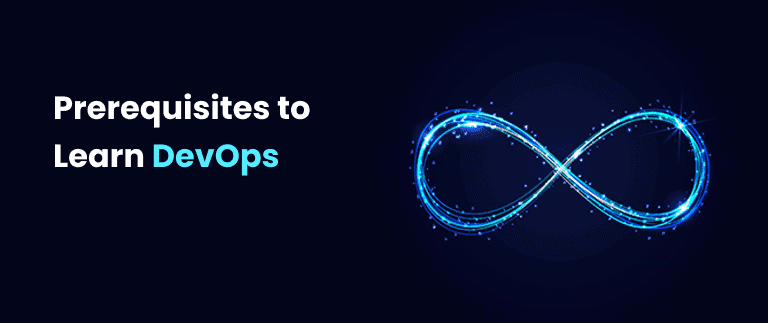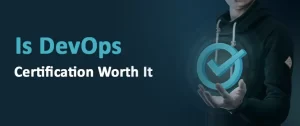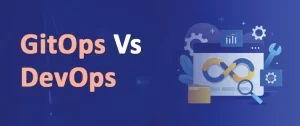DevOps is quickly becoming a hot topic of discussion among IT aspirants. With the rising demand, the field is set to touch $30 billion by 2028 at a compounded yearly growth rate of more than 20% for 2022-2028. In such a situation, the liking for the field comes as no surprise. However, learning DevOps is not that easy. You need to bend hard to become a successful professional. Additionally, you should get familiar with some prerequisites to learn DevOps to fare better in this technology sector. That will help you learn faster and improve in your position
What is DevOps?
DevOps is a combination of cultural philosophies, tools, and methods that improves an organization’s capability to deliver applications/services at high velocity: evolving and enhancing products at a faster rate than organizations using conventional software development and management processes. This speed allows companies to serve their customers better and compete more efficiently.
DevOps is a methodology that automates and integrates the processes between software product development and IT teams. It stresses technology automation, team empowerment, and cross-team communication.
The DevOps movement started around 2007 when the development and IT operations communities flagged concerns about the conventional software development model. In the traditional software development system, developers who write code work apart from operations teams who deploy and support the code. The terminology DevOps, a mixture of the words development and operations, indicates the process of integrating these ideologies into a single continuous process.
What Are the Prerequisites to Learn DevOps?
Excelling in DevOps warrants some knowledge on your end. You should get familiar with the following:
- Basic understanding of Unix/Linux system concepts as well as administration
- Knowing the workings of the build and deployment process
- Familiarity with the command-line interface (CLI)
- Linux networking basics
- Familiarity with text editor
- Knowledge of basic scripting
- Basics of applications – Python, Java, NodeJS
- Databases – MongoDB, MySQL
- Web servers – PM2, Apache HTTPD, G-Unicorn
Basic Understanding of Software Development
DevOps is a methodology that emphasizes integration and collaboration between development and operations teams. So, a basic understanding of software development is one of the important DevOps prerequisites because it helps to ease the gap between these two teams and ensure the efficient flow of the product from development to deployment and operations to delivery.
DevOps engineers stay in control of each stage of software development, from design through deployment and maintenance to delivery. They are vital to the success of software development initiatives as they combine two teams (developers and IT personnel) to make code deployment and delivery more effective and faster. As a result, you are likely to engage with these professionals if you are a software development business or a customer. DevOps learning prerequisites will support you in mastering the practices and skills that a modern-day DevOps engineer requires.
Operating Systems and Networking
Understanding operating systems and networks is also a must-have to stand out as a DevOps engineer/architect. This helps to understand how operating systems work for building and deploying efficient and reliable applications. Using this knowledge, you can troubleshoot problems successfully with operating systems, such as security concerns or performance issues.
It becomes easier to work on different environments such as Windows and Linux and effectively deploy applications. Networking, on the other hand, helps engineers grasp the workings of networks for deploying production applications and ensuring they are easily accessible to users.
Security and Compliance
Maintaining data security and avoiding any mishap is among the top requirements for all IT operations. DevOps engineers should be thoroughly aware of best security practices and compliance standards, given the existence of data privacy issues and security breaches in today’s digital era. This allows engineers to employ strong security measures at every stage of software development and deployment.
Compliance skills help to comply with infrastructure and applications that fall in with legal frameworks and industry standards. Secure coding techniques, security testing, and frequent vulnerability assessments are some of the ways DevOps engineers may include security into the development/deployment process, thus minimizing risks and ensuring protection from possible dangers. A foundational understanding of DevOps training prerequisites, including compliance and security, allows engineers to build safer and compliant systems, ensuring success and overall resilience in software development and deployment.
Programming Languages
DevOps practices are based on programming, which allows engineers to create effective solutions, automate workflows, and promote continuous development. As a result, programming is a prerequisite for DevOps to develop unique tools, write scripts, and make reliable automation frameworks. DevOps engineers must know programming languages such as Ruby, Python, or Java.
Programming expertise allows DevOps professionals to successfully work with software developers, understand their code base, and provide insightful suggestions for scalability or performance enhancements. The capability to code makes debugging and troubleshooting easier because engineers can detect problems quickly through log analysis and employ fixes.
.
DevOps Training and Certification
Although practical knowledge and hands-on experience are valuable, training/certification is one of the prerequisites for DevOps learning. Formal certification and training offer a complete and structured understanding of DevOps. Training provides engineers with solid groundwork and a shared vocabulary to promote productive collaboration and communication with cross-functional teams.
Certificates are a testament to dedication and proficiency in mastering DevOps best practices and methodologies. Through proper training, you can attain a profound grasp of DevOps’s fundamental practices, principles, and tools. This knowledge will help you effectively implement these concepts in practical situations.
Certification validates your knowledge and skills, improving marketability and providing an edge in the job market. So, it is essential to prioritize certification and training, acquiring the skills needed to become a DevOps engineer.
Communication and Collaboration
Collaboration and communication abilities are other DevOps prerequisites because they operate at the interface between software operations and development, filling out the gap between various teams. Collaboration is the main cultural aspect of DevOps, which unifies the development and operations teams. Real-time communication and feedback allow teams to change applications while preserving a resilient and stable environment.
DevOps aims to eliminate the traditional barriers between development and operations teams. So, communication as a DevOps requirement skill is a must as it allows engineers to get aware of dependencies, plan their work, and resolve disagreements, and other issues as and when they arise through open and clear communication.
Automation Tools
Automating all processes and facilitating work is one of the main tasks of DevOps professionals. A skilled DevOps engineer must be able to automate the whole pipeline, including continuous integration and delivery, configurations, infrastructure, application performance tracking, and others.
The automation skill is related to knowledge of scripting languages, required toolsets, and coding. Automation tools and technologies facilitate all workflows and manual tasks, leading to faster software development and deployment.
A skilled engineer, to ensure high-quality automation, will need the knowledge and skills of bash, PowerShell utilities, Python, GNU, and JavaScript, AWS Lambda, CloudWatch Events, SNS, cron, and others.
Continuous Learning and Growth Mindset
In the ever-evolving technological world, adapting to constant learning is essential to being productive and relevant in DevOps. So, a growth mindset and continuous learning is the underlying skill required for DevOps engineers to adapt to new techniques, tools, and technologies by continually learning and improving.
A positive growth vision helps struggling engineers with a desire to learn from their mistakes. They are open to testing new concepts and methods and see failures as a ladder for improvement. This type of thinking motivates businesses and teams to develop continuously.
Speed and Logic
Today, time is of the essence. If you lag in this respect, you will be thrown out of the competition. No company or professional would ever want to face such a scenario. So, it is vital to be a quick learner and adapt to DevOps. Whether it is getting familiar with new skills or understanding a new technique, you must take a proactive approach here.
Also, logic plays a key role in DevOps. Smart professionals who reach new heights in the field are those who apply a logical approach when dealing with complex problems. Logic lets you solve any issues in any walk of life, including the DevOps process. So, learn the basics of logic and understand how to apply them in DevOps when handling technical or management issues.
Cloud Computing
DevOps and Cloud are related closely to one another in the development process, but the performance of one directly depends on the other. DevOps solutions manage the process, but the Cloud employs this process, providing it with the right setup to test, deploy, and release codes.
Cloud computing skills with a little bit of experience help you design and create your own Cloud systems, simplify complex Cloud systems, and employ best practices over different Cloud service offerings. Currently, the key Cloud services are IBM, Amazon Web Services, Google Cloud, and Microsoft Azure.
Problem-Solving
DevOps engineers must be passionate, self-motivated, learnable, proactive, and innovative. The desire to constantly learn will allow professionals to stay updated with suitable tools, new technologies, and solutions, which is a must-have in this fast-changing environment. That should help them solve problems as they emerge during the code development and deployment process.
Problem-solving and decision-making are essentially high-end art that top professionals must acquire. DevOps engineers are a special mention here. They need to make decisions quickly amid changing development and deployment situations. Things may go wrong and problems may turn up during the development and/or delivery process.
As a professional, you should solve problems quickly and make timely, pragmatic decisions to fix such issues. Failure here will result in the failure of the product as well as the project.
Understand the DevOps Process
An understanding of the entire DevOps process is essential to become a successful professional. Like any other field, DevOps requires you to know the different steps involved in the process. Here is a list of the stages.
- Continuous Integration (CI)
Continuous Integration is a software development approach that involves integrating the developers’ code multiple times a day. Whenever a developer submits his code, an automated pipeline (server) verifies those changes and provides feedback quickly, alerting the developer of any errors. This ensures that any issues get identified and resolved fast, thus saving time in the long run.
- Continuous Delivery (CD)
CD is a software development technique that allows the code to be deployed during the development and production stage at any given time. Its purpose is to make sure that the software is released to production with minimal manual intervention, dependably and quickly.
The process requires automating the whole process of software release, including building, testing, and deployment. This technique is beneficial because it reduces the duration between changes in code and bug fixes or the implementation of new features for end-users.
- Continuous Testing
The success of DevOps largely depends on quality and proper testing. Automated tests should run permanently without any failures. Continuous testing can minimize the time required to get feedback after code testing.
The key task of DevOps professionals lies in speeding up product delivery to users as quickly as possible. The quality of the software product to be delivered plays an important part here.
Engineers should constantly test their work and be aware of top-rated automated continuous testing tools such as TestComplete, Selenium, and TestingWhiz, as well as continuous monitoring tools such as Splunk, Zabbix, Nagios, and others.
- Continuous Monitoring
These tools are used to monitor systems and applications automatically to find problems early and avoid them from becoming major issues.
DevOps engineers and other professionals should be experts with monitoring tools such as Splunk and Nagios. Additionally, they should be able to detect production system problems, upgrade system versions, and apply security updates. These are vital prerequisites for DevOps training and learning.
- Continuous Deployment
Continuous Deployment is an approach that allows the release of every code change that passes all production pipeline stages to customers. Here, every code change undergoes an automated pipeline involving building, testing, and deployment. If it passes all checks and tests, it is released to production automatically, with no manual intervention needed in the release process.
This highly automated process minimizes the time to market for bug fixes and new features and ensures that customers always get access to the latest version of the product.
Who is a DevOps Engineer?
He is a technology expert who pays close attention to code deployment and release processes in collaboration with software developers, system operators, and other IT staff. Right from code release and deployment to code maintenance and updates, a DevOps engineer implements tools, methods, and processes, to stabilize needs throughout the software development lifecycle.
Some organizations hire freelancers to perform DevOps for their workflow, but this only widens the gap between developers and operations teams as successful DevOps adoption commands changes in the method as well as culture. So, there has to be a structured and well-organized workflow to ensure collaboration between developers and operations teams.
Any DevOps engineer has a series of responsibilities in his position. He needs to manage the IT infrastructure that ensures software codes run in hybrid, multi-tenant, or cloud environments. DevOps engineers have to provide resources, implement a testing procedure for each release validation, decide on an appropriate deployment method, and monitor performance after the release.
How to Become a DevOps Engineer?
After knowing the demand and lucrative remuneration, you may be desperate to become a DevOps professional. However, the roles and the position are not so simple. You must work hard to get a job.
First and foremost, you should consider earning a master’s or a bachelor’s degree in computer science or a related field. Although having such a degree is a perk, even certification courses come in handy if you have a thorough understanding of DevOps.
Besides technicalities, you should possess some soft skills such as communication and patience. On many occasions, you may face stressful situations during a project. During such times, you should exercise patience and ensure the job is properly executed while ensuring an uninterrupted flow of communication between software development and operations teams.
Most importantly, you must know how to plan a project, gather the necessary resources, and manage different teams for efficient and speedy software development and delivery.
Final Thoughts
DevOps is the future of IT technology. While it may evolve with time, nothing can replace it. This is why more and more companies are switching to this smart methodology for software development and deployment. As a result, the demand for DevOps engineers and related professionals keeps ticking with time. If you want to excel in the field, find out the prerequisites to learn DevOps and take the right training in this respect. With proper certification and experience, you can land a lucrative job even in a competitive job market.
| “Want to take your IT career to the next level? Explore our Advanced Cloud Native DevOps Master Program to enhance your DevOps career now!” |
Amol Shete
Senior Software Engineer
A well-experienced DevOps engineer who loves to discuss cloud, DevOps, and Kubernetes. An energetic team player with great communication & interpersonal skills.
FAQ's
Becoming a DevOps engineer warrants expert knowledge of the field. The following are the essential DevOps learning prerequisites.
- Strong Hold on Linux Basics and Scripting – Learning how to run operating systems is a must before joining DevOps courses
- Knowledge of Different Tools as well as Methodologies – Understanding different methodologies and tools helps you fix issues associated with software development, testing, deployment, and delivery.
- Soft Skills such as communication and collaboration – Effective communication and collaboration will resolve conflicts and problems while ensuring error-free software applications on time.
First of all, check a reliable DevOps tutorial. Also, check out free online resources in the arena of DevOps. You can join certificates or graduate programs based on your personal preferences and skills. However, a thorough knowledge and a certificate are prerequisites to learn DevOps. Additionally, you must get some experience by working as an intern or a consultant.
Switching to DevOps may sound easy, but it is not so simple. You need to understand the basics of the field before making a switch. First of all, you should have a good grasp of computer programming languages.
Next, you should know how to collaborate and communicate with different members of different teams. Essentially, you should possess managerial skills. Finally, you must learn how to code/deploy software products and a general understanding of the DevOps process.





